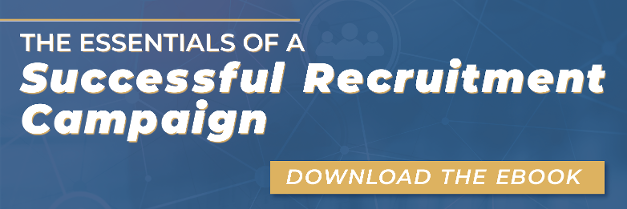7 Benefits of a Recruitment Marketing Strategy
Recruitment marketing efforts use inbound marketing approaches to reach prospective candidates and nurture them throughout the pre-application stages of learning about employers. They can help you develop the profile of the right-fit candidates, educate professionals about your employer brand, and set the foundation for the relationship between future candidates and your organization.
It's an employee's market! So, many employers today face two critical challenges:
- Recruiting talented or experienced employees
- Retaining employees long-term
Ultimately, this comes down to one core issue: targeting and hiring long-term employees who fit your organization well. Through this process, you intently target prospective employees with information about working for your company, and you can develop a clear employer brand.
Not convinced recruitment marketing is the right approach for your organization? Consider these seven hefty recruitment marketing benefits.
1. Appeal to Top Industry TalentSmaller organizations often can't compete with enterprise-level organizations regarding pay or health and retirement benefits. However, your company can still attract top talent with clearly defined features and a unique value proposition. For example, your organization may offer a special mission, prioritize employee satisfaction and work-life balance, or provide the remote employment and flexible scheduling prospective candidates prefer. You can also use proactive recruitment marketing to reach top talent before your competitors.
2. Make Recruiting More EfficientRecruitment marketing focuses on the beginning stages of talent acquisition: garnering the interest of potential candidates, educating professionals about your company, and creating content about open roles. This streamlines the latter stages of the acquisition process: applications, interviews, and hiring. This simplifies the process so your team can focus on qualified and aligned candidates.
3. Create a Better Candidate ExperienceCandidate experience matters more than ever before. By deliberately crafting the process for a positive candidate experience, you can create relationships with talented professionals who think well of your company. Word will spread that you treat applicants well, enhancing your employer brand reputation.
4. Reach Your Diversity and Inclusion GoalsDiversity, Equity, and Inclusion (DEI) efforts are important for every organization. Developing a plan for addressing DEI goals can help address gaps in your employee pool and further enhance your reputation as an employer. Recruitment marketing includes developing candidate avatars—or hypothetical representations of ideal candidates with detailed profiles regarding skills, interests, and preferred channels. You can use this stage to directly plan for achieving your diversity and inclusion goals and ensure you're reaching out to candidates who share your values.
5. Develop Your Employer BrandJust like a company in a competitive product niche needs to develop unique and compelling branding, employers must set themselves apart from the crowd with distinctive employer brands. Are you a fun employer that offers perks and excellent company culture? Are you devoted to sustainability and ethics? Do you prioritize employee safety, a healthy work-life balance, or equitable practices? What are your corporate values?
Expressing those values engagingly and authentically can help your organization develop a distinct identity. Not only is this helpful for overall brand recognition, but it can further streamline hiring efforts because candidates who align with your brand or vision can find you more readily.
6. Measure Your Results More EffectivelyRecruiting, hiring, and onboarding are complex processes. To find employees and reduce turnover, you must closely examine every stage of the processes and outreach channel.
With a well-organized recruitment marketing strategy, you can collect data that answers regarding:
- What types of candidates stay with your organization long-term, and which ones lead to the most churn and turnover
- Which outreach channels generate the most promising candidates or the most disappointing
- How to frame messaging for brand awareness campaigns or campaigns for filling specific positions
Like conventional campaigns, the more data you have, the better. You can trim back inefficiencies, move more purposefully, and plan for future campaigns.
7. Enjoy a More Cost-Effective Hiring ProcessHiring is expensive, with the average cost of finding and hiring a new worker at $4,000. It also takes weeks to find the right fit. That means hiring an employee who's a poor fit is doubly expensive: your organization pays to hire them and the new one who will fill their spot. The recruitment marketing benefits when it comes to saving money include:
- Shortening that timeline, so you're paying third-party recruiters less or ensuring in-house teams spend time on other projects
- Reducing the risk of turnover by zeroing in on highly aligned candidates
- Spending less on downtime or in-house inefficiencies as teams wait for a vital position to be filled
Choose Mid-West Family for Recruitment Marketing Support
At Mid-West Family Eau Claire, we're here to help growing businesses with their different marketing strategies, including recruitment marketing. Contact us today to see how we can help you develop a cohesive recruitment marketing strategy and start your first campaign.

.jpg)

